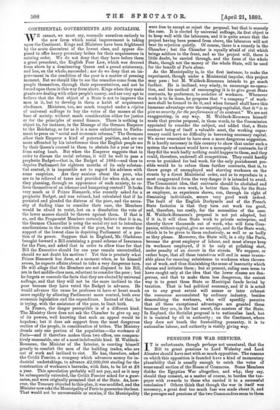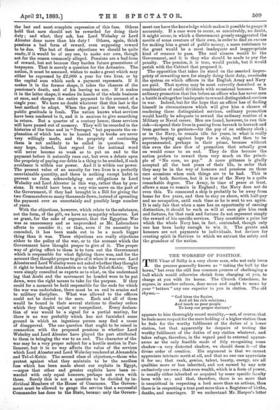PENSIONS FOR WAR SERVICES.
IT is unfortunate, though perhaps not unnatural, that the Bill to grant pensions to Lord Wolseley and Lord Alcester should have met with so much opposition. The reasons on which this opposition is founded have a kind of momentary plausibility that is usually enough to catch the votes of some small section of the House of Commons. Some Members dislike the Egyptian War altogether, and why, they say, should they consent, as a matter of course, to burden the taxpayer with rewards to those who carried it to a successful conclusion ? Others think that though the war in itself was necessary, a great deal too much fuss was made about it, and the peerages and pensions of the two Commanders seem to them
the last and most complete expression of this fuss. Others hold that men should not be rewarded for doing their duty ; and what, they ask, has Lord Wolseley or Lord Alcester done more than his duty ? Others, again, think pensions a bad form of reward, even supposing reward to be due. The last of these objections we should be quite ready, if it would be of any use, to make our own, though not for the reason commonly alleged. Pensions are a bad form of reward, but not because they burden future generations of taxpayers. That is merely a question for the Actuaries. The nation, it must be assumed, wishes to make a grant which may either be expressed by £2,000 a year for two lives, or by the capital sum which such a payment represents. If it makes it in the former shape, it takes the chances of the pensioner's death, and of his leaving no son. If it makes it in the latter shape, it washes its hands of the whole business at once, and charges the entire payment to the account of a single year. We have no doubt whatever that this last is the best method to adopt. When the grant is first voted, the public gratitude is fresh. The nation knows what services have been rendered to it, and it is anxious to give something in return. But a quarter of a century hence, these services will have passed out of memory. They will be recorded in the histories of the time and in "Peerages," but payments the explanation of which has to be hunted up in books are never very willingly made, and the propriety of continuing them is not unlikely to be called in question. We may hope, indeed, that regard for the national word will never become so weak as to put an end to the payment before it naturally runs out, but even a debate upon the propriety of paying our debts is a thing to be avoided, if such avoidance is within our power. And it is within our power. The present value of an annuity for two lives is a perfectly ascertainable quantity, and there is nothing except habit to prevent us from acknowledging our obligations to Lord Wolseley and Lord Alcester in this way, rather than by pensions. It would have been a very wise move on the part of the Government, if they had brought in a Bill for giving the two Commanders so many thousands down, instead of spreading the payment over an uncertainly and possibly large number of years.
With the objections, however, which relate to the substance, not the form, of the gift, we have no sympathy whatever. Let us grant, for the sake of argument, that the Egyptian War was as unnecessary and as unprovoked as Mr. Labouchere affects to consider it ; or that, even if its necessity be conceded, it has been made out to be a much bigger thing than it was. These objections are really objections either to the policy of the war, or to the account which the Government have thought proper to give of it. The proper way of giving effect to them is to turn out the Government which is responsible for what fighting there was, and for the account they thought proper to give of it when it was over. Lord Alcesterand Lord Wolseley were not asked whether they thought it right to bombard Alexandria or to take Tel-el-Kebir. They were simply consulted as experts as to what, on the understand ing that Arabi and the movement he headed were to be put down, were the right means to take for the purpose. If they could for a moment be held responsible for the ends for which the war was undertaken, there must be an end to armies and to military discipline. What was allowed to the officers could not be denied to the men. Each and all of them would be bound in their several stations to disobey orders which they thought unjust or inexpedient. Every declaration of war would be a signal for a partial mutiny, for there is no war probably which has not furnishel some ground in which an ingenious person may find a cause of disapproval. The one question that ought to be raised in connection with the proposed pensions is whether Lord Wolseley and Lord Alcester have played the part attributed to them in bringing the war to an end. The character of the war may be a very proper subject for a hostile motion in Parliament, but it in no way affects the value of the services which Lord Alcester and Lord Wolseley rendered at Alexandria and Tel-el-Kebir. The second class of objectors,—those who protest against what they maintain to be the needless fuss which has been made about our exploits in Egypt, —argue that other and greater exploits have been rewarded with only equal honours, perhaps not even with those. Surely this is not a question to be decided by individual Members of the House of Commons. The Government must be allowed to gauge the service that a successful Commander has done to the State, becaus3 only the Govern ment can have the knowledge which makes it possible to gauge it accurately. If a case were to occur, as conceivably, no doubt, it might occur, in which a Government grossly exaggerated the merits of some creature of their own, in order to find an excuse for making him a grant of public money, a mere resistance to the grant would be a most inadequate and inappropriate kind of censure to pass. The real sinners would be the Government, and it is they who should be made to pay the penalty. The pension, it is true, would perish, but it would perish with the Cabinet that proposed it.
The opposition that takes its stand on the asserted impropriety of rewarding men for simply doing their duty, overlooks the system on which officers in the English Army and Navy are paid. That system may be most correctly described as a combination of small dividends with occasional bonuses. The ordinary promotion that lies before an officer who has never seen a battle is altogether inadequate to reward distinguished services in war. Indeed, but for the hope that an officer has of finding himself in circumstances which will give him a chance of rendering these distinguished services, ordinary promotion would hardly be adequate to reward the ordinary routine of a Military or Naval career. Men are found, however, to run this risk—to spend their lives in passing from barrack to barrack and from garrison to garrison—for the pay of an ordinary clerk ; or in the Navy, to remain idle for years, in what is really poverty, hoping against hope for a ship, and then to be superannuated, perhaps in their prime, because without this even the slow flow of promotion that actually goes on would come to an end. They do this because the nation prefers to reward them very much on the principle of "No cure, no pay." A mere pittance is gladly accepted all the beat years of their life, in order that they may be in the way of honours and pensions on those rare occasions when such things are to be had. This is true of both Services, but it is true of the Navy in a quite remarkable degree. The Army, in time of peace at least, allows a man to remain in England ; the Navy does not do even this. To command a ship is probably to be away from home for five years, and then to stay on shore, with half-pay and no occupation, until such time as he is sent to sea again. It is only fair that when a man has an opportunity of earning distinction, it should be such as will at once give him rank and fortune, for that rank and fortune do not represent simply the reward of his specific services. They constitute a prize for which the whole Navy has, in fact, contended, though only one has been lucky enough to win it. The grants and honours are not payments to individuals, but devices for creating spirit in Services to which we entrust the safety and the grandeur of the nation.



































 Previous page
Previous page